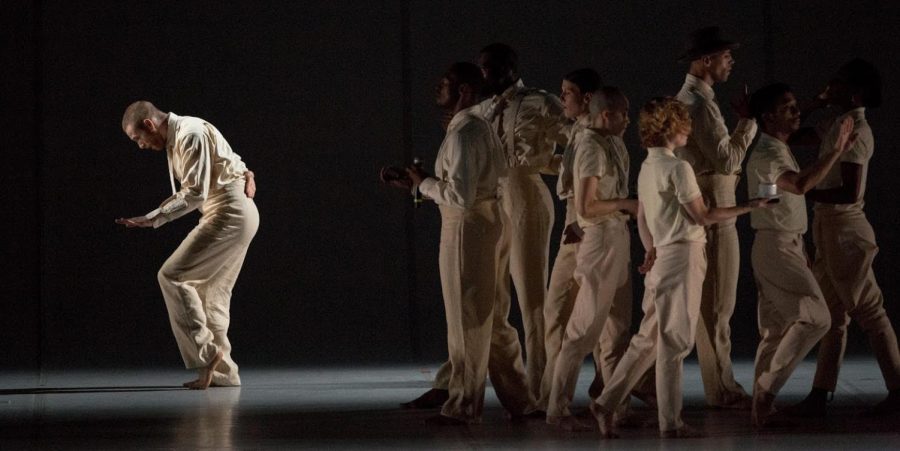A Jewish Nurse, a Gay Man and a Wealthy Heir Walk into Skirball
A scene from the 6 hour play Analogy Trilogy.
September 26, 2018
I can’t say I knew what to expect as I walked into NYU’s Skirball Center for the Performing Arts last Saturday afternoon. I had mentally prepared myself to see a six-hour-long performance titled the “Analogy Trilogy.” I knew the performance consisted of three different storylines in three different acts and that these acts were to be figurative discussions on memory, but other than that I was free and clear of all expectations of the performance. Or so I thought.
Ten minutes in, I realized that the “Analogy Trilogy” more closely resembled an impressionist painting more than any kind of conventional theater performance. The stage was sterile and bare, and the only visible set consisted of large wooden cutouts painted red and white, a cubic structure made out of silver pipes and a singular white cot. Throughout the performance, the ensemble would move these pieces to create different makeshift scenes including a psychiatric ward, a Jewish internment camp and a U.S. prison.
In the beginning, there was just music and movement and, although beautiful, very much disorienting. I kept asking myself what I was watching. Was it a play? Was it an interpretive dance showcase? Was I missing something? I wasn’t sure if my confusion was key to this unapologetically contemporary performance. But I was rewarded for my attentiveness.
The stories chosen by Bill T. Jones to inspire the “Analogy Trilogy” were absolutely heartbreaking. Within the confines of a stark, white stage, the cast unflinchingly performed the abstractly parallel lives of a Jewish nurse, a gay man named Pretty and a young, “mentally unfit” heir named Cosmo. Yes, that’s the whole cast. Roles, and the emotions that clung to them, were shared and passed between cast members with a toss of the microphone. Even when one cast member was the main portrayer of a character, like Jenna Riegel in her stunning performance as Dora, other cast members would periodically take on the voice of that character for a few lines of dialogue.
Unlike many of the other artistic liberties the “Analogy Trilogy” took — like its use of selfie videos that broke the fourth wall or its off-putting strobe lighting during emotionally jarring scenes — this fluid transaction and subsequent return of the same story with different voices was a fresh and whimsical additional to the performance. It takes a truly innovative and talented company to be able to pull off such universality. But still, one dancer stands out among the rest.
Standing straight, Carlo Antonio Villanueva was easily the shortest person on stage Saturday evening, but his technique and emotive performance was impossible to miss. Mr. Villanueva had several solos throughout the “Analogy Trilogy,” but none were more powerful than his performance as Cosmo in the final act, “The Emigrant.” Cosmo, the young heir to a large fortune, was shy and standoffish. In a twisted, unfair turn of events, Cosmo is sent to a mental institution and it is alluded to that his mental unfitness was largely due to his sexuality. With this in mind, minutes before the entire trilogy came to a close, Mr. Villanueva takes a single silver pole, at least twice his height, and enacts a memorable interpretation of the late life of Cosmo through elegant balancing acts.
And what is the “Analogy Trilogy” if not a balancing act between dance, music and memory?
Email Claire Fishman at [email protected].

























































































































































